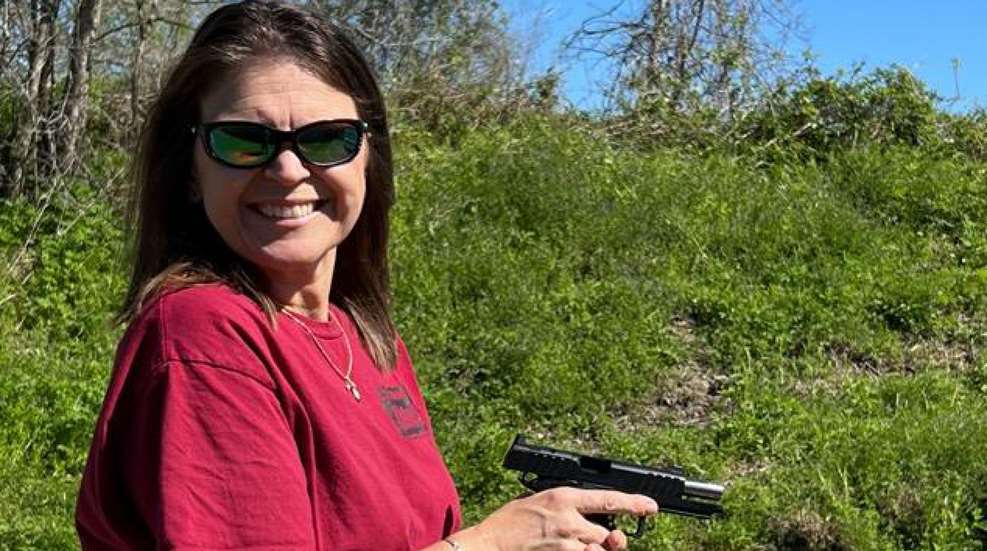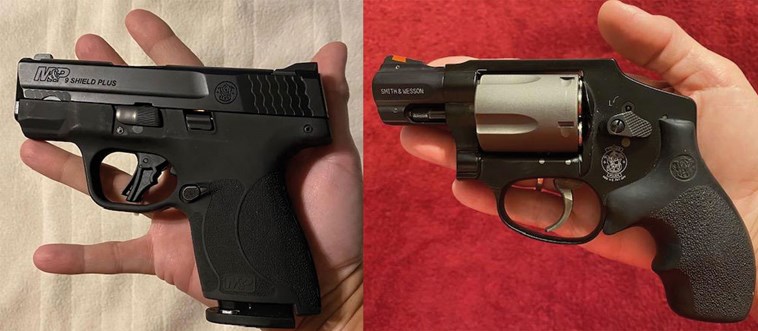Dilemma: What CCW Firearm Should I Get Her?
Tags:
It’s a question nearly all gun owners get asked at some point. And most of them botch it.
by HEIDI LYN RAO posted on December 14, 2023
NEWS, LIFESTYLE, TIPS & TACTICS, CONCEALED CARRY, FIREARMS
Support NRA Women DONATE

Dilemma: What CCW Firearm Should I Get Her? – NRA Women.com
One of the most common questions asked to a gun owner–firearms Instructors in particular–is, “What gun should my (wife, girlfriend, daughter, etc.) carry for protection?” And unfortunately, when I hear that question being asked, I almost always also hear the same canned vague response: “You should try different guns to find one that feels right in your hands, and that you can shoot.” Womp, womp …
I, too, pose this question to candidates in my NRA Instructor courses because they need to be prepared to answer it. This question initiates a thought-provoking discussion. I first ask the men in the class to answer the question. Predictably, I get the same vague answer from every single man.
I then ask the women in the class if the information was helpful. “Nope, not at all!” is how each woman typically responds. Many of the women also confirm that they, too, have heard the canned answer many times, and that it was no help to them when choosing a firearm. Several even shared their stories about purchasing their first firearm. The scenario was often the same: An individual gave them practically the same advice, but then proceeded to choose a gun for them.
It is very important when someone asks an avid shooter or a firearm instructor this universal question, they guide them in their search by presenting them with the pros and cons of different firearms and the best application for specific action types. This is done by the very scientific process of … asking questions! You are, in essence, interviewing the person who is asking you the question. There are two questions that you should always ask someone seeking your advice on what they should get their loved one for protection. These are:
- What is the firearm skill level of the individual receiving the firearm? and
- Are you giving a complete gift?
What Is Their Skill Level?
The first thing you should ascertain is the skill level of the person receiving a firearm as a gift. You should already know this answer but ask it anyway. Usually the person asking this question is a gun owner but is not an avid shooter, otherwise he or she would have already taken the person to the range and exposed them to one or more different types of firearm actions. The answer to the question almost always is that the recipient of the gift has virtually no experience with firearms, because if they had been, they would at least have some idea of what they liked and wanted.
Avid shooters and firearms instructors tend to overthink the question, “What firearm should I get my (her) for protection?” This is because most individuals who are asked this question take it as a compliment, as they should, that another person is seeking their advice. However, this sometimes invites the avid shooter or firearm instructor to seize the moment to tell the person asking the question all they know about firearms. They start talking about magazine capacity, ease of reloading, and guns that can still shoot after getting wet, dusty, muddy, etc.
The safe and proper use–with an emphasis on safe–of firearms and their operations takes practice. Practice develops muscle memory. It is muscle memory that allows us to do our daily activities. For example, when you were young, your first bike was probably a small bike with training wheels, not a 10-speed mountain bike. You had to first master the bike that took the fewest amount of muscle memory, before you could progress to more complex modes of transportation. If you were initially given a 10-speed mountain bike, you would probably become frustrated, store it in the garage until you could “grow” into it, or switch to another activity or hobby because you did not have a good first experience riding a bike and feel “it just was not right for you.” We certainly do not want this to happen with new gun owners.
If you are gifting a firearm to a new gun owner, remember the purpose is to give her a tool for self-defense. But if she is not ready or comfortable with the firearm you give her, it will probably be left at home and not be with her if ever needed. An individual’s first gun should accomplish several things: The gun should provide some form of protection immediately at the time it is received; it should be simple enough to operate that a new gun owner feels comfortable carrying the firearm; and it should not only serve the purpose of protection, but also serve as a confidence builder confidence until a more complex firearm, if desired, can be safely carried and operated.

A good option would be the one that takes the most muscle memory. For example, I do not suggest a striker-fired semi-automatic pistol with no manual safety for an individual that has not developed the muscle memory to keep her trigger finger indexed or “off the trigger until ready to shoot,” complying with NRA’s Rules for Safe Gun Handling.
A simple, small-caliber handgun might be an excellent option as a first firearm for a new shooter, until they are ready to progress to a more complex gun. There are many manufacturers that offer .22 LR, .38 Spl., and .380 Auto derringers, revolvers and semi-automatic pistols that have redundant internal and external manual safeties, to decrease the chance of an accidental discharge.

Too small? Too big? Just right!
Are YOU Giving a Complete Gift?
When you give a gift, it should be capable of immediate enjoyment. This can be as simple as buying a gift that requires batteries and including a pack of batteries needed. This also applies to safety equipment such as giving a helmet, knees pads, and elbow pads if you give a teenager a new skateboard. Firearms are no different.
If you are giving a firearm to someone for personal protection, it is a good idea to include a box of ammunition that matches the type of firearm you are giving. If they are a new gun owner, they will also need eye and ear protection. More importantly, do not forget the items they will need to be a responsible gun owner. One of the most important items a responsible gun owner needs is a way of securing their firearm.
In some locations, you might be putting your loved one in conflict with local and state laws. In some jurisdictions, any firearm that is not in a person’s direct control must be secured. Depending on the city and state, the type of security device might be regulated. Even if your loved one lives in a jurisdiction that does not require a firearm to be secured by a specific device, it is the gun owner’s responsibility to ensure that their firearm cannot be accessed by unauthorized individuals, including minors. Security devices can be as simple as utilizing the gun lock that is required to be included with a new firearm purchase. Other options are firearm lock boxes or a gun safe.
A responsible gun owner must also be properly trained. If you decide to give someone a firearm for protection, it is important that you are a responsible gift giver so your loved one will be a responsible gun owner. Include a gift certificate to enroll in a basic firearm training course, with your thoughtful gift of self-protection. The NRA has Certified Instructors who teach NRA Basic Pistol, Rifle and Shotgun courses. NRA Certified Instructors also offer the next level of training to include CCW, and Personal Protection Inside and Outside the Home. NRA Instructors are considered to be the Gold Standard in firearms training. There is sure to be a certified NRA Firearm Instructor near where your loved one lives.
It is important to remember that there is not just one firearm for every activity. The gun needs to be matched to its intended purpose. This rule seems to be lost on many avid shooters and firearm instructors when asked the question of the right gun to give to a loved one. Do not expect a new shooter to be able to safely operate YOUR choice in a firearm. In fact, most new gun owners prefer a simple firearm chambered for a smaller caliber. Provide options to those seeking your advice on guns that meet the intended purpose of the activity. That intended purpose is to provide a safe, self-defense firearm to a new shooter.
